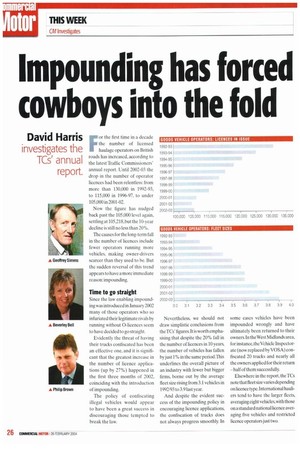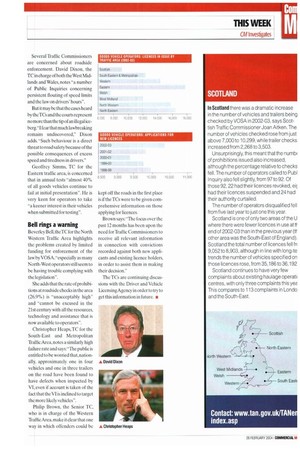Impounding has forced cowboys into the fold
Page 26

Page 27

If you've noticed an error in this article please click here to report it so we can fix it.
or the first time in a decade the number of licensed haulage operators on British roads has increased, according to the latest Traffic Commissioners' annual report. Until 2002-03 the drop in the number of operator licences had been relentless: from more than 130,000 in 1992-93, to 115,000 in 1996-97, to under 105,000 in 2001-02.
Now the figure has nudged back past the 105,000 level again. settling at 105,218. but the 10-year decline is still no less than 20%.
The causes for the long-term fall in the number of licences include fewer operators running more vehicles, making owner-drivers scarcer than they used to be. But the sudden reversal of this trend appears to have a more immediate reason: impounding.
Time to go straight Since the law enabling impounding was introduced in January 2002 many of those operators who so infuriated their legitimate rivals by running without 0-licences seem to have decided to go straight.
Evidently the threat of having their trucks confiscated has been an effective one, and it is significant that the greatest increase in the number of licence applications (up by 27%) happened in the first three months of 2002, coinciding with the introduction of impounding.
The policy of confiscating illegal vehicles would appear to have been a great success in discouraging those tempted to break the law. Nevertheless, we should not draw simplistic conclusions from the TCs' figures.It is worth emphasising that despite the 20% fall in the number of licences in 10 years. the number of vehicles has fallen by just 1% in the same period.This underlines the overall picture of an industry with fewer but bigger firms, borne out by the average fleet size rising from 3.1 vehicles in 1992/93 to 3.9 last year.
And despite the evident success of the impounding policy in encouraging licence applications. the confiscation of trucks does not always progress smoothly. In some cases vehicles have been impounded wrongly and have ultimately been returned to their ownersIntheWest Midlands area, for instance, theVehicle Inspectorate (now replaced by VOSA) confiscated 20 trucks and nearly all the owners applied for their return — half of them successfully.
Elsewhere in the report, the TCs note that fleet size varies depending on licence type. International hauliers tend to have the larger fleets, averaging eight vehicles.with those on a standard national licence averaging five vehicles and restricted licence operators just two, Several Traffic Commissioners are concerned about roadside enforcement. David Dixon, the TC in charge of both the West Midlands and Wales, notes "a number of Public Inquiries concerning persistent flouting of speed limits and the law on drivers' hours".
But it may be that the cases heard by theTCs and the courts represent no more than the tip of an illegal iceberg."I fear that much lawbreaking remains undiscovered," Dixon adds. "Such behaviour is a direct threat to road safety because of the possible consequences of excess speed and tiredness in drivers."
Geoffrey Simms, TC for the Eastern traffic area, is concerned that in annual tests "almost 40% of all goods vehicles continue to fail at initial presentation". He is very keen for operators to take "a keener interest in their vehicles when submitted for testing".
Bell rings a warning Beverley Bell.thelt for the North Western Traffic Area highlights the problems created by limited funding for enforcement of the law by VOSA,"especially as many North-West operators still seem to be having trouble complying with the legislation".
She adds that the rate of prohibitions at roadside checks in the area (26.9%) is "unacceptably high" and "cannot be excused in the 21st century with all the resources, technology and assistance that is now available to operators".
Christopher Heaps, TC for the South-East and Metropolitan Traffic Area, notes a similarly high failure rate and says: "The public is entitled to he worried that, nationally, approximately one in four vehicles and one in three trailers on the road have been found to have defects when inspected by VI, even if account is taken of the fact that the VI is inclined to target the more likely vehicles", Philip Brown, the Senior TC, who is in charge of the Western Traffic Area,make it clear that one way in which offenders could be kept off the roads in the first place is if the TCs were to be given comprehensive information on those applying for licences.
Brown says:-'The focus over the past 12 months has been upon the need for Traffic Commissioners to receive all relevant information in connection with convictions recorded against both new applicants and existing licence holders, in order to assist them in making their decision."
The TCs are continuing discussions with the Driver and Vehicle LicensingAgency in order to try to get this information in future. in






























































































































































































